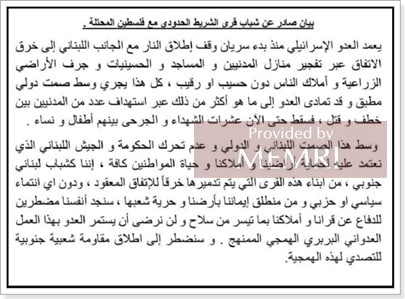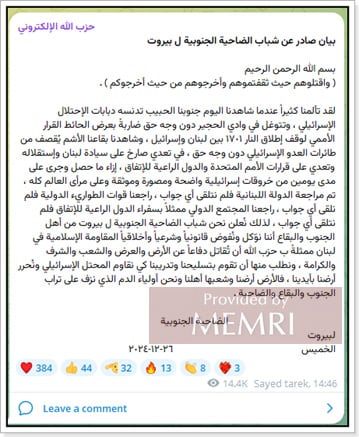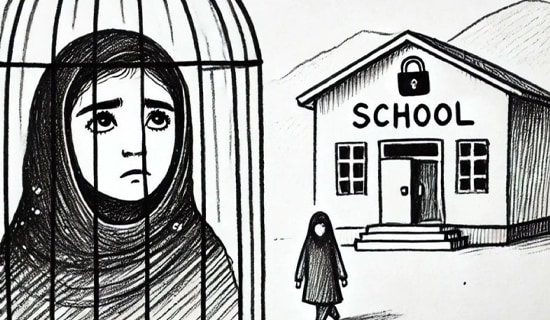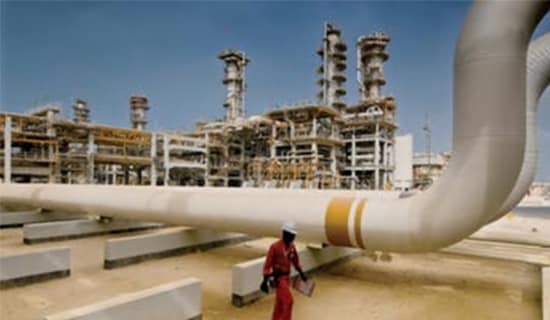On December 26, 2024, about a month after the ceasefire between Israel and Lebanon came into effect, Hizbullah supporters on social media circulated two messages by two previously unknown groups calling themselves the "Youth of the Villages of the Strip Bordering Occupied Palestine" and the "Youth of Beirut's Southern Dahiyeh." In the statements, the groups announced their intention to wage armed resistance against the Israeli forces in southern Lebanon, with one of the groups even asking Hizbullah to provide it with equipment and training. The groups justified their decision to fight Israel by accusing it of violating the Lebanon-Israel ceasefire agreement that was signed on November 27, 2024, and said that Israel is not deterred by the international parties charged with overseeing the ceasefire, nor by the Lebanese armed forces.
These messages were published against the backdrop of mutual accusations by Israel and Hizbullah regarding violation of the ceasefire agreement. Israel continues to dismantle Hizbullah infrastructures and thwart its efforts to protect its capabilities and weapons by transferring them north of the Litani River, instead of handing them over to the Lebanese military, whose capabilities are limited and which has so far shown no serious intention of dismantling Hizbullah's infrastructure.
The authenticity of the two groups that issued the announcements is difficult to ascertain. It is possible that they are branches of Hizbullah that were created in order to continue militant activity in South Lebanon under the guise of "popular resistance," and in light of Hizbullah's frustration with the ongoing damage to its military infrastructures and its desire to prevent the full implementation of the ceasefire agreement, as it has previously done with United Nations Security Council Resolution 1701.
It appears that figures close to the organization have already given the green light for these actions by stating that they "understand the anger of the residents" who "will not continue to remain silent" about Israel's operations in South Lebanon.[1] Ibrahim Al-Amin, board chairman of the pro-Hizbullah daily Al-Akhbar, wrote two days after the posting of the groups' messages that action against Israeli forces can be taken either by Hizbullah or by "new groups."
So far, these "popular" groups have expressed their readiness to act against the Israeli forces, but in the future they may also target the Lebanese security forces and UNIFIL troops, which are tasked with dismantling Hizbullah's infrastructure and seizing its weapons in accordance with the ceasefire agreement.
The use of fictitious groups and the waging of military action disguised as "popular resistance by locals" are well-known tactics used by Hizbullah and by the Iran-backed resistance axis, to which it belongs.[2] Over the recent years, Hizbullah operatives disguised as local residents have initiated several confrontations with UNIFIL forces that were seeking to prevent the presence of Hizbullah militant forces in South Lebanon. One example is the December 14, 2022 confrontation between "locals" and UNIFIL forces during which Sean Rooney, a peacekeeper from UNIFIL's Irish Contingent, was killed and three others were wounded. Contrary to Hizbullah's claims, the clashes with UNIFIL were not local and spontaneous initiatives, but rather deliberate actions carried out by Hizbullah operatives.[3] Another tactic used by Hizbullah is to disguise its military activity on the border with Israel – which is prohibited under Resolution 1701 – as activity by a local environmental organization known as "Green Without Borders."[4]
This report will provide an overview of the statements issued by the two new groups, along with translated excerpts from the article by Ibrahim Al-Amin regarding the legitimacy of their resistance to Israel.
Local Groups: We Will Wage "Popular Resistance" Against The Enemy's Forces In South Lebanon
On December 26, 2024, a group calling itself "The Youth of the Villages of the Strip Bordering Occupied Palestine" published a statement threatening to launch "popular resistance" using "weapons in its possession." Seeking to distance itself from Hizbullah, the group asserted that it has nothing whatsoever to do with any existing organization. The statement read:
"Since the ceasefire with Lebanon came into effect, the Israeli enemy has been deliberately violating the agreement… In the face of the Lebanese and international silence – and the inaction of the Lebanese government and of the military, which we trust to defend our lands, our property and the lives of all citizens – we, the youth of South Lebanon, residents of the villages that are being destroyed in violation of the agreement that was signed, claiming no political or organizational affiliation and out of faith in our land and in the liberty of our nation, declare that we are being forced to defend our villages and our property using the weapons that we have in our possession. We will not let the enemy continue this deliberate hostile and barbaric activity, and we are being forced to launch a popular resistance in the south in order to confront this aggression."[5]

The statement by the "Youth of the Villages of the Strip Bordering Occupied Palestine" (X.com/RaniaYounes16, December 26, 2024)
On the same day, another group named the "Youth of Beirut's Southern Dahiyeh" likewise published a statement threatening to carry out armed operations against the Israeli forces in South Lebanon. The statement said that the group comprises residents of South Lebanon and of the Beqaa Valley, areas in which Israel carries out military operations. This group also called on Hizbullah to resume fighting and to arm and train its operatives. Its statement read:
"It caused us great pain today to see the tanks of the Israeli occupation defiling our beloved south and infiltrating the depth of the territory in Wadi Al-Hajir, without any right to do so and in flagrant violation of United Nations [Security Council] Resolution 1701 regarding the ceasefire between Israel and Lebanon… We appealed to the Lebanese state but received no answer; we appealed to UNIFIL but received no answer; we appealed to the international community, represented by the ambassadors of the countries that guarantee the agreement, but received no answer. Therefore, we – the Youth of Beirut's Southern Dahiyeh, from among the residents of the south and of the Beqaa Valley – declare that we legally, Islamically, and morally empower that the Islamic resistance in Lebanon, which is represented by Hizbullah, to fight in order to defend the land, the honor and the nation. We [also] ask it to arm and train us so that we can resist the Israeli occupation and liberate our lands with our own hands…"[6]

The statement by the "Youth of Beirut's Southern Dahiyeh" (T.me/Electronhizbullah, December 27, 2024)
Pro-Hizbullah Daily Al-Akhbar: Resistance Against The Israeli Forces Is Legitimate, Whether By Hizbullah Or By New Groups
Two days after these statements were published, Ibrahim Al-Amin, board chairman of the pro-Hizbullah Lebanese daily Al-Akhbar, hinted at the existence of these groups, writing that Israel's violations of the ceasefire agreement grant legitimacy to action against the Israeli forces, whether by Hizbullah or by "new groups." In the article, titled "There Is No Choice but Resistance against the Enemy's Violations," he criticized the ceasefire agreement and said that none of the parties meant to oversee the agreement are taking responsibility and restraining Israel. He added that all the elements in Lebanon – including the commanders of the military, Lebanon's interim prime minister Najib Mikati, and Lebanese Parliament Speaker Nabih Berri – have warned the U.S. about the dangers of Israel's behavior and called on it to stop this behavior, but the U.S. has not done a thing.
He emphasized: "The only thing accomplished by the operations of the occupation army [i.e. the Israeli army] is to grant renewed legitimacy to any action taken by the resistance – whether by Hizbullah or by new groups that believe they have a responsibility to stand up to what the enemy is doing. Even though the people are already weary of war and do not want to leave their homes again, the cost of conflict with the occupation forces will be less than the cost of surrendering to what the enemy is currently doing. Resistance is the only possible option in the face of the enemy's arrogance."[7]
It should be noted that, as of this writing, Hizbullah has not made any official reference to these new groups. People "close to" Hizbullah have denied any connection to the "messages," telling the Lebanese daily Al-Nahar that "the option of defending the homeland and defeating the occupier is the basis for Hizbullah's existence, and it has no need to hide behind fictitious messages or names." However, these individuals expressed support for these initiatives, essentially greenlighting them, explaining that they "understand the anger of the residents, who will certainly not continue to remain silent and will not agree to going backwards."[8]
[1] Al-Nahar (Lebanon), December 30, 2024.
[2] In 2020, Iran-backed Shiite militias in Iraq adopted a similar tactic in order to attack U.S. forces in Iraq and Syria without sparking a American military response against them. The tactic involved having various previously unheard-of "grassroots" groups, under different names, claim responsibility for attacks against U.S. forces and convoys. See: MEMRI Inquiry & Analysis Series No. 8640, New Iranian Tactic Unknown Group Issues Statement Of Responsibility For Attacks On U.S. Forces In Iraq, March 16, 2020; MEMRI JTTM Report Iran-Backed Shi'ite Militias In Iraq: We Will Declare War Against U.S. Forces If They Don't Leave By End Of 2021, December 30, 2021.
[3] For more about the conflicts between UNIFIL forces and Lebanese "locals," and about Hizbullah's threats against UNIFIL forces, see: MEMRI Special Dispatch No. 10390, Lebanese Journalists: Hizbullah Responsible For Death Of Irish UNIFIL Soldier, December 22, 2022; MEMRI JTTM Report Hizbullah Escalates Its Threats To UNIFIL Following UN Resolution To Extend Its Mandate For Another Year And Expand Its Authority, September 13, 2022; MEMRI Special Dispatch No. 9721, Lebanese Journalists: Hizbullah Behind Attacks By South Lebanon Residents On UNIFIL Forces, January 13, 2022.
[4] For more about "Green Without Borders," see MEMRI Inquiry & Analysis Series No. 1681, Locals In South Lebanon: Hizbullah Using Environmental Organization As Cover For Activity Near Israel-Lebanon Border, February 27, 2023.
[5] X.com/RaniaYounes16, December 26, 2024.
[6] T.me/Electronhizbullah, December 27, 2024.
[7] Al-Akhbar (Lebanon), December 28, 2024.
[8] Al-Nahar (Lebanon), December 30, 2024.




